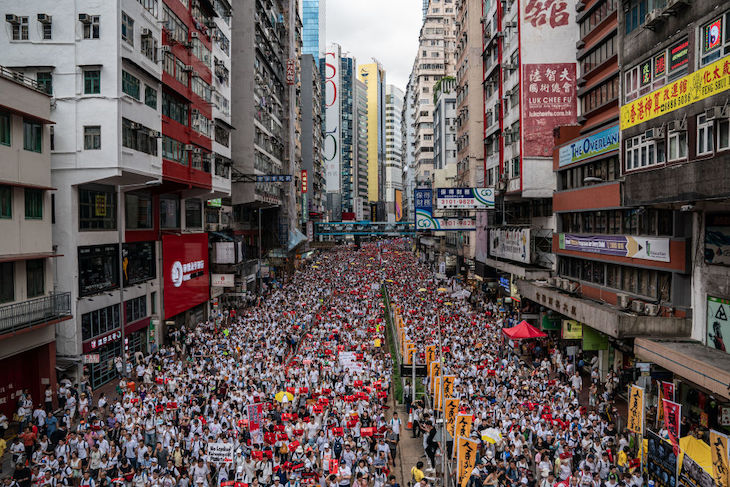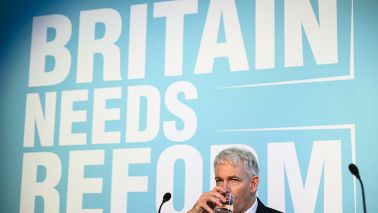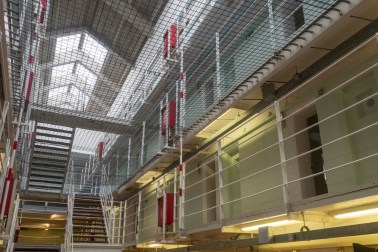Today in Westminster Abbey, Britain will remember the life of one of our most inspirational, colourful and remarkable political leaders: Paddy Ashdown. As we do, I know he would want us to remember our responsibilities to Hong Kong, a cause close to his heart.
Paddy lived in Hong Kong from 1967 to 1970 while in the special forces, returned in 1989 to march in protest at the Tiananmen massacre, and campaigned for the right of abode for Hong Kong holders of British National Overseas (BNO) passports, prior to the handover. When I helped found Hong Kong Watch just under two years ago, Paddy agreed to be one of our patrons, and was a steadfast ally in speaking out against the increasing erosion of Hong Kong’s freedoms.
My politics are different from his, but in his steadfast commitment to freedom no one could have a truer friend. I know that Paddy, if he were still alive today, would be appalled at Britain’s failure to speak out clearly for Hong Kong in its hour of need.
The Prime Minister and the Foreign Secretary do, of course, have certain other matters on their mind. As Hong Kong’s most serious crisis since the handover continues to escalate, Britain is facing a political and potentially constitutional crisis of its own. Nevertheless that does not absolve us of our moral and legal responsibility to Hong Kong.
Last week Hong Kong’s Chief Executive Carrie Lam finally announced proposals to withdraw the controversial extradition bill which sparked more than three months of protests. But Hong Kongers emphasise that this step is far too little, far too late.
The bill, if it had been implemented, would have destroyed the ‘firewall’ that had deliberately been created for the handover to separate Hong Kong’s legal system, (based on the rule of law, fair trial and an independent judiciary) from mainland China’s, which features widespread torture, disappearances, forced televised confessions, executions and a judiciary that is simply a unit of the Communist Party. It would have destroyed Hong Kong.
Badly thought-out, dangerous and unnecessary, it should never have been proposed in the first place. Having introduced the bill, Carrie Lam should have listened to lawyers, business people, chambers of commerce and foreign governments, (including the US Secretary of State, the British Foreign Secretary and the European Union) who spoke out against it early on. Yet Lam refused to listen, even when a million people in Hong Kong peacefully protested, and she only suspended the bill the day before two million people took to the streets. Even after proclaiming the bill ‘dead’, Lam refused to formally withdraw it, allowing it to further toxify the atmosphere. Only now, after months of protests, some violence by a minority of demonstrators and appallingly disproportionate and indiscriminate brutality by the police, has she finally conceded. But the protesters now have other demands.
What started as a specific movement against a dangerous bill has morphed into a campaign for political reform in Hong Kong. Anger over the bill stems from a deeper frustration at the increasing erosion of Hong Kong’s freedoms and autonomy, and a sense of disenfranchisement from mainstream politics. In the past five years pro-democracy legislators and candidates have been disqualified from Hong Kong’s legislature, peaceful demonstrators jailed, booksellers publishing titles critical of Beijing’s leaders abducted, academic and press freedom threatened, and the Financial Times’ Asia news editor expelled. I myself was denied entry to Hong Kong almost two years ago, on Beijing’s orders.
I have also received more than a dozen anonymous threatening letters from Hong Kong, some of which were also sent to my neighbours in the quiet London suburb in which I live, and to my mother. And last year I was subjected to a vitriolic haranguing from a Chinese state TV reporter at the Conservative Party Conference, who then assaulted one of our volunteers. My experiences are nothing compared to the profound and grave crisis in Hong Kong, but they give me some taste of the Chinese Communist Party’s modus operandi of intimidating, threatening and trying to silence its critics. It is in nobody’s interests to allow Xi Jinping’s regime to succeed in this. And it is all the more reason to stand up for Hong Kong.
The international community must step in to urge Beijing and Carrie Lam to agree to the protesters’ demands. An independent inquiry into police brutality must be established, with powers to hold those responsible accountable and to end the climate of impunity that has prevailed. A reform package should then be introduced to allow universal suffrage for all seats in Hong Kong’s parliament at the next election, and for the election of the Chief Executive in 2022. Currently only some seats in Hong Kong’s parliament are directly elected, and the Chief Executive is chosen by a small electoral college of a few hundred handpicked by Beijing. Unless Hong Kongers feel they have a stake and a say in the way they are governed, the protests will continue.
Britain has a responsibility to speak out for Hong Kong’s freedoms, and for ‘one country, two systems’, under the Sino-British Joint Declaration, an international treaty lodged at the United Nations. But of course it cannot do so alone. For that reason Britain should lead an initiative at the UN to establish a ‘contact group’ of like-minded countries – the United States, Canada, Australia, the European Union and its member states, and Asian democracies such as Japan and Korea – to coordinate an international response to the crisis. Germany’s Angela Merkel has already spoken out more clearly than Boris Johnson for Hong Kong, and will almost certainly be a key ally.
The possibility of offering an international mediator should be considered, to broker talks between the Hong Kong government and the demonstrators. Targeted sanctions – under the ‘Magnitsky’ legislation, which Dominic Raab sponsored – against key Hong Kong government and police officials responsible for severe violence should also be on the table.
Steps should be taken to offer Hong Kongers, and particularly BNO passport holders, protection, as UK parliamentarians such as Tom Tugendhat, and Fiona Bruce have proposed. In the current climate, talk of opening our doors to seven million Hong Kongers is unlikely to be well received in some quarters. But if we work with our allies, particularly those in the Commonwealth, it could be achievable. And Hong Kongers, who are among the most dynamic, creative and entrepreneurial people imaginable, will be an asset not a burden to Britain, as the UK seeks to strengthen its workforce and develop a global vision post-Brexit.
So as much as the Prime Minister and the Foreign Secretary have other things on their mind right now, I hope they will spare a moment to think about Hong Kong, to speak out clearly, publicly and repeatedly in defence of the basic human rights and autonomy which were promised to Hong Kongers at the handover, show leadership in the world by building a global coalition, and offer protection to Hong Kong people, or at least to those who have British passports but no British abode. And as we remember Paddy Ashdown, let’s remember that this is what he would be calling for if he were with us today. To do our duty.
Benedict Rogers is founder and Chair of Hong Kong Watch, and deputy chair of the Conservative Party Human Rights Commission.






Comments